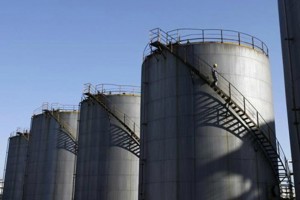China teapots to extend oil buying spree into 2017
BEIJING (Reuters) -- China's small, independent refiners are set to raise their crude oil imports again in 2017 on expectations that Beijing will keep their intake quotas steady, market participants said, a move that should help eat up some of the global supply glut.
Officials at three independent refineries and an official involved in national import policy said they expected the government to keep next year's crude oil import quotas for independents unchanged to slightly higher.
Called "teapots" due to the small capacities of their plants compared with the big state-run refineries, the independents made up nearly 90 percent of China's crude oil import growth this year, helping to put the world's No.2 economy on course to challenge the United States as the top importer.
Next year, teapots will contribute 200,000-400,000 bpd to China's crude import growth, out of an overall import rise of 500,000-700,000 bpd, according to estimates from research consultancy Energy Aspects.
"For the teapots, crude imports (and ensuing product sales and exports) are also an opportunity to expand their share of the domestic retail market and to develop a regional footprint in Asia and potentially beyond," said Michal Meidan, an Energy Aspects analyst.
In 2016, China has raised its imports by nearly 900,000 bpd on average, more than enough to supply the whole of the Netherlands, thanks largely to 17 new teapot buyers.
Thomson Reuters Research and Forecasts estimates teapots will import about 5 MMt of crude oil in December, or 1.18 MMbpd, highest since the independents were allowed to staring importing crude in mid-2015.
That compares with an average of 31.3 MMt of total crude imports a month for the first 11 months of the year.
Shandong Chambroad Petrochemicals Co, a teapot granted with 3.31 MMt in annual import quotas (66,000 bpd), said it expects little change in quota policy for the coming year.
"It was a major policy decision for the government to let teapots import foreign crude, and we have not noted any change," said Chambroad's spokeswoman Sun Chaoyang.
An official with China Petroleum and Chemical Industry Federation, which screens potential new importers, agreed, saying the agency expected to grant one or two new approvals before year-end.
Teapots now have some 1.26 million bpd in crude quotas, and their rise in the market has forced state refiners to scale back some refinery operations and sent China's fuel exports surging to record highs.
Reporting by Chen Aizhu; Editing by Tom Hogue







Comments